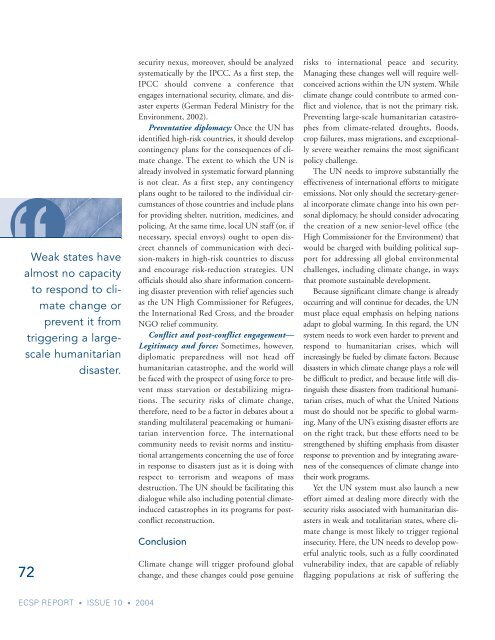Environmental Change and Security Project Report - Woodrow ...
Environmental Change and Security Project Report - Woodrow ...
Environmental Change and Security Project Report - Woodrow ...
Create successful ePaper yourself
Turn your PDF publications into a flip-book with our unique Google optimized e-Paper software.
Weak states have<br />
almost no capacity<br />
to respond to climate<br />
change or<br />
prevent it from<br />
triggering a largescale<br />
humanitarian<br />
disaster.<br />
72<br />
security nexus, moreover, should be analyzed<br />
systematically by the IPCC. As a first step, the<br />
IPCC should convene a conference that<br />
engages international security, climate, <strong>and</strong> disaster<br />
experts (German Federal Ministry for the<br />
Environment, 2002).<br />
Preventative diplomacy: Once the UN has<br />
identified high-risk countries, it should develop<br />
contingency plans for the consequences of climate<br />
change. The extent to which the UN is<br />
already involved in systematic forward planning<br />
is not clear. As a first step, any contingency<br />
plans ought to be tailored to the individual circumstances<br />
of those countries <strong>and</strong> include plans<br />
for providing shelter, nutrition, medicines, <strong>and</strong><br />
policing. At the same time, local UN staff (or, if<br />
necessary, special envoys) ought to open discreet<br />
channels of communication with decision-makers<br />
in high-risk countries to discuss<br />
<strong>and</strong> encourage risk-reduction strategies. UN<br />
officials should also share information concerning<br />
disaster prevention with relief agencies such<br />
as the UN High Commissioner for Refugees,<br />
the International Red Cross, <strong>and</strong> the broader<br />
NGO relief community.<br />
Conflict <strong>and</strong> post-conflict engagement—<br />
Legitimacy <strong>and</strong> force: Sometimes, however,<br />
diplomatic preparedness will not head off<br />
humanitarian catastrophe, <strong>and</strong> the world will<br />
be faced with the prospect of using force to prevent<br />
mass starvation or destabilizing migrations.<br />
The security risks of climate change,<br />
therefore, need to be a factor in debates about a<br />
st<strong>and</strong>ing multilateral peacemaking or humanitarian<br />
intervention force. The international<br />
community needs to revisit norms <strong>and</strong> institutional<br />
arrangements concerning the use of force<br />
in response to disasters just as it is doing with<br />
respect to terrorism <strong>and</strong> weapons of mass<br />
destruction. The UN should be facilitating this<br />
dialogue while also including potential climateinduced<br />
catastrophes in its programs for postconflict<br />
reconstruction.<br />
Conclusion<br />
Climate change will trigger profound global<br />
change, <strong>and</strong> these changes could pose genuine<br />
risks to international peace <strong>and</strong> security.<br />
Managing these changes well will require wellconceived<br />
actions within the UN system. While<br />
climate change could contribute to armed conflict<br />
<strong>and</strong> violence, that is not the primary risk.<br />
Preventing large-scale humanitarian catastrophes<br />
from climate-related droughts, floods,<br />
crop failures, mass migrations, <strong>and</strong> exceptionally<br />
severe weather remains the most significant<br />
policy challenge.<br />
The UN needs to improve substantially the<br />
effectiveness of international efforts to mitigate<br />
emissions. Not only should the secretary-general<br />
incorporate climate change into his own personal<br />
diplomacy, he should consider advocating<br />
the creation of a new senior-level office (the<br />
High Commissioner for the Environment) that<br />
would be charged with building political support<br />
for addressing all global environmental<br />
challenges, including climate change, in ways<br />
that promote sustainable development.<br />
Because significant climate change is already<br />
occurring <strong>and</strong> will continue for decades, the UN<br />
must place equal emphasis on helping nations<br />
adapt to global warming. In this regard, the UN<br />
system needs to work even harder to prevent <strong>and</strong><br />
respond to humanitarian crises, which will<br />
increasingly be fueled by climate factors. Because<br />
disasters in which climate change plays a role will<br />
be difficult to predict, <strong>and</strong> because little will distinguish<br />
these disasters from traditional humanitarian<br />
crises, much of what the United Nations<br />
must do should not be specific to global warming.<br />
Many of the UN’s existing disaster efforts are<br />
on the right track, but these efforts need to be<br />
strengthened by shifting emphasis from disaster<br />
response to prevention <strong>and</strong> by integrating awareness<br />
of the consequences of climate change into<br />
their work programs.<br />
Yet the UN system must also launch a new<br />
effort aimed at dealing more directly with the<br />
security risks associated with humanitarian disasters<br />
in weak <strong>and</strong> totalitarian states, where climate<br />
change is most likely to trigger regional<br />
insecurity. Here, the UN needs to develop powerful<br />
analytic tools, such as a fully coordinated<br />
vulnerability index, that are capable of reliably<br />
flagging populations at risk of suffering the<br />
ECSP REPORT • ISSUE 10 • 2004

















